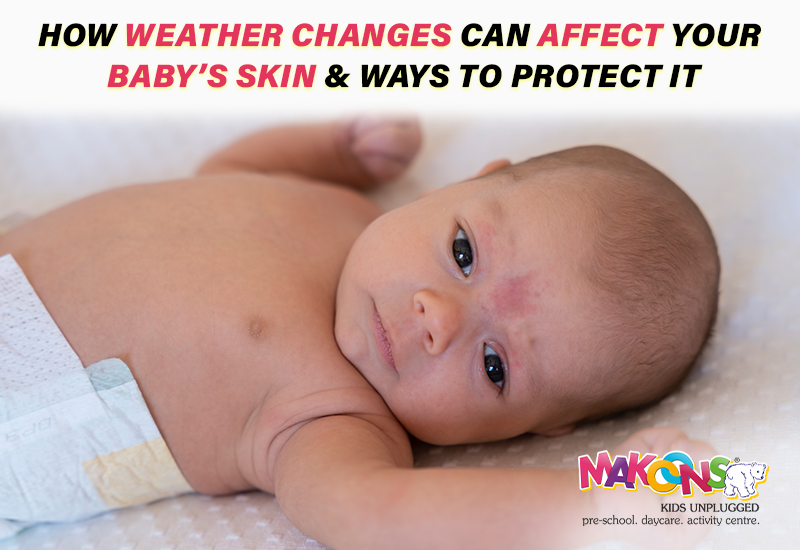As a parent, you are well aware of just how soft and delicate your baby’s skin is. It is one of the first things that you notice and something that you automatically want to guard. But did you know that something as seemingly simple as a change in the weather can significantly impact your little one’s sensitive baby skin? From dry, flaky patches during winter to rashes and sunburn during summer, knowledge of these effects is the beginning of providing the best baby skin care.Let’s start with how the different seasons could affect your baby’s skin and review some crucial baby skin protection advice.
Understanding Your Baby’s Skin
Thinner and more delicate than adult skin is that of infants. It responds fiercely to environmental changes and dries out more quickly. Babies are quite sensitive to weather-related skin issues ranging from winter dryness to summer heat rash.
Winter Wishes: Fighting Dryness and Irritation
Your baby’s skin will lose natural moisture far more quickly when the temperature drops and the air gets dry. This can lead to certain winter skin problems including:
Dryness and flakiness: It refer to Your baby’s face, hands, and feet can have coarse, scaly patches. Their skin could even seem lackluster.
Chapping: Cold winds chafe sensitive areas including the lips and cheeks, which becomes red, painful, and even cracked.
Eczema Flare-ups: If your infant has sensitive baby skin or is eczema-prone, the dry winter air can aggravate flare-ups that cause itchy, inflammatory skin.
Winter Baby Skin Care Tips and Protective Advice
Soft and consistent infant skin care is absolutely crucial to combat these winter blues:
- Lukewarm water baths: Even although a long, hot bath would seem nice in winter, it will strip your baby’s skin of its natural oils. Take quick, lukewarm baths for five to ten minutes.
- Moisturize Right Away: After a bath, gently pat your baby’s skin dry then in a few minutes apply a thick, fragrance-free, hypoallergenic moisturizer to seal in moisture. Search for substances including ceramides, petrolatum, shea butter.
- Use Gentle Cleansers: Steer clear of harsh soaps that dry out the skin. Use mild, fragrance-free baby cleansers.
- Humidify the Air: Having a humidifier in your baby’s bedroom can help put moisture back into dry winter air, keeping the skin from drying out.
Summer Skin Saviors: Shielding Against Sun and Sweat
Summer presents its own brand of problems for your baby’s sensitive skin:
- Sunburn: Infants possess little melanin, the protective pigment that prevents the skin from absorbing damaging UV rays, leaving them extremely vulnerable to sunburn. : Even a few minutes of intense sun can cause redness, pain, and blisters.
- Heat Rash (Prickly Heat): Prickly Heat Sweat gets caught under your baby’s skin in warm and humid conditions, usually on the neck, chest, and skin folds, producing minor red or pink bumps.
- Dehydration: Though not a direct skin issue, your baby’s skin may seem dry and less elastic.
Summer Time Baby Skin Care Tips for Parents
Regular soothing skin care is absolutely vital to guard your babies against summer hazards:
- Dress for the heat: Get dressed for the heat. Choose light, loose natural fiber clothing like cotton that lets skin breathe.
- Avoid direct sunlight: Keep your infant away from direct sunlight, particularly between 10 am and 4 pm when the UV radiation is highest.
- Keep skin cool and dry: Replace wet or sweaty clothes as soon as possible and provide cool baths to your baby to avoid heat rash.
- Boost fluid consumption: Breastfeeding, formula, or water will help you keep your baby hydrated and skin moist from the inside out.
Caring for Sensitive Baby Skin Year-Round
Irrespective of the season, certain babies need concentrated sensitive baby skin care with special attention.
Signs of Sensitive Baby Skin
- responds quickly to fresh products, causing irritation or rash.
- Eczema or dry patch tendency
- Easily irritated by clothes, heat or cold fluctuations, or bathing
General Advice on Sensitive Baby Skin Care
- Mild, scent-free items: Use laundry detergent made for delicate skin, lotions, and hypoallergenic baby wash.
- Test new items in patches: On a small area of your baby’s skin, test new skincare products and wait 24 hours to see any reaction.
- Avoid potential irritants: Steer clear of products including alcohol, fragrances, colors, or irritating substances.
- Choose fabrics carefully: Before first wear, wash new clothes and dress your infant in soft, natural-fiber items including organic cotton.
Baby Skin Protection Tips
The changes between seasons are difficult since skin has to alter with temperature.
- Change your daily moisturizing schedule: During hot weather, alternate between more emollient creams and lighter lotions.
- Prepare for shifting seasons: Have warm and cool seasonally relevant items within reach.
- Check your baby’s comfort level: Look for indicators of discomfort that would point to skin issues such redness, fussiness, or itching.
- Establish a regular bathing schedule: Although you have regular bathing practices, change the water temperature and moisturizing agent..
You can Also Read –Top skincare tips for the first month
Conclusion
Remember that every infant has different skin; what works for one could not work for another. See how your child’s skin responds to different products and weather; then, change your approach. Good care and attention will help you make sure your kid has comfortable, healthy skin during the changing seasons.


